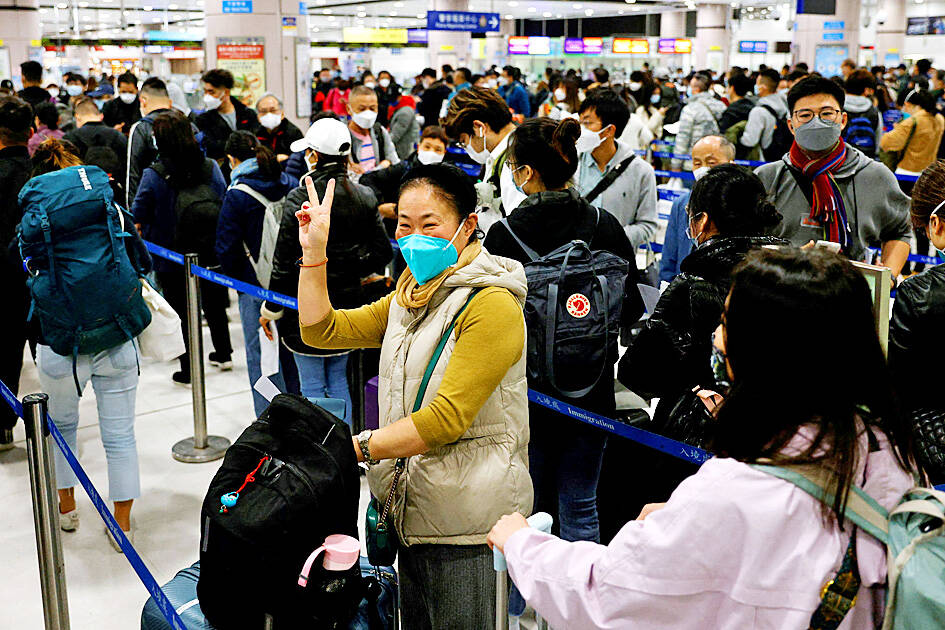China yesterday lifted quarantine requirements for inbound travelers, ending almost three years of self-imposed isolation even as the country battles a surge in COVID-19 cases.
The first people to arrive expressed relief at not having to undergo the grueling quarantines that had become a fixture of life in China.
Beijing last month began a dramatic dismantling of a hardline “zero COVID” strategy that had enforced mandatory quarantines and punishing lockdowns. The policy had a huge effect on the world’s second-biggest economy and generated resentment throughout society that led to nationwide protests just before it was eased.

Photo: Reuters
At Shanghai’s Pudong International Airport, a woman surnamed Pang yesterday said she was thrilled with the ease of travel.
“I think it’s really good that the policy has changed now, it’s really humane,” she said. “It’s a necessary step I think. COVID has become normalized now and after this hurdle everything will be smooth.”
At Beijing Capital International Airport, barriers that once kept international and domestic arrivals apart were gone, as were the “big whites” — staff in hazmat suits long a fixture of life in “zero COVID” China.
Meanwhile, people streamed through border crossing points from Hong Kong.
After years of separation from his wife in China, Hong Kong resident Cheung Seng-bun made sure to be among the first in line.
“I’m hurrying to get back to her,” Cheung, lugging a heavy suitcase, said as he prepared to cross at Lok Ma Chau Station, which was filling with eager travelers.
However, those crossing between Hong Kong and mainland China are still required to show a negative COVID-19 test taken within the past 48 hours — a measure China has protested when imposed by other countries.
Limited ferry services also were also restored from China’s Fujian Province to Taiwan’s Kinmen County just off the Chinese coast.
Official data showed that about 410,000 people in Hong Kong planned to travel north in the next two months, while about 7,000 people in mainland China planned to travel south yesterday.
The expected surge in visitors has led more than a dozen countries — most recently Germany, Sweden and Portugal — to impose testing requirements on travelers from China.
The Civil Aviation Authority of Thailand said in a statement on Saturday that starting early today, all foreign arrivals must prove they are vaccinated or provide a letter certifying that they have recovered from COVID-19 within six months.
Additional reporting by AP and Reuters

US PUBLICATION: The results indicated a change in attitude after a 2023 survey showed 55 percent supported full-scale war to achieve unification, the report said More than half of Chinese were against the use of force to unify with Taiwan under any circumstances, a survey conducted by the Atlanta, Georgia-based Carter Center and Emory University found. The survey results, which were released on Wednesday in a report titled “Sovereignty, Security, & US-China Relations: Chinese Public Opinion,” showed that 55.1 percent of respondents agreed or somewhat agreed that “the Taiwan problem should not be resolved using force under any circumstances,” while 24.5 percent “strongly” or “somewhat” disagreed with the statement. The results indicated a change in attitude after a survey published in “Assessing Public Support for (Non)Peaceful Unification

The CIA has a message for Chinese government officials worried about their place in Chinese President Xi Jinping’s (習近平) government: Come work with us. The agency released two Mandarin-language videos on social media on Thursday inviting disgruntled officials to contact the CIA. The recruitment videos posted on YouTube and X racked up more than 5 million views combined in their first day. The outreach comes as CIA Director John Ratcliffe has vowed to boost the agency’s use of intelligence from human sources and its focus on China, which has recently targeted US officials with its own espionage operations. The videos are “aimed at

SHIFT: Taiwan’s better-than-expected first-quarter GDP and signs of weakness in the US have driven global capital back to emerging markets, the central bank head said The central bank yesterday blamed market speculation for the steep rise in the local currency, and urged exporters and financial institutions to stay calm and stop panic sell-offs to avoid hurting their own profitability. The nation’s top monetary policymaker said that it would step in, if necessary, to maintain order and stability in the foreign exchange market. The remarks came as the NT dollar yesterday closed up NT$0.919 to NT$30.145 against the US dollar in Taipei trading, after rising as high as NT$29.59 in intraday trading. The local currency has surged 5.85 percent against the greenback over the past two sessions, central

STEADFAST FRIEND: The bills encourage increased Taiwan-US engagement and address China’s distortion of UN Resolution 2758 to isolate Taiwan internationally The Presidential Office yesterday thanked the US House of Representatives for unanimously passing two Taiwan-related bills highlighting its solid support for Taiwan’s democracy and global participation, and for deepening bilateral relations. One of the bills, the Taiwan Assurance Implementation Act, requires the US Department of State to periodically review its guidelines for engagement with Taiwan, and report to the US Congress on the guidelines and plans to lift self-imposed limitations on US-Taiwan engagement. The other bill is the Taiwan International Solidarity Act, which clarifies that UN Resolution 2758 does not address the issue of the representation of Taiwan or its people in